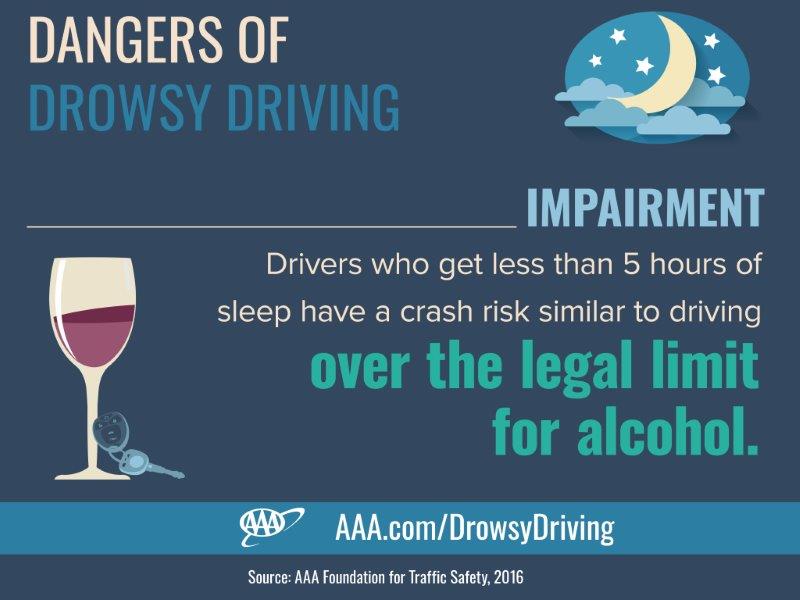Just two hours of missed sleep can impair driving performance as severely as alcohol
BOISE – (December 6, 2016) – Inadequate sleep can be as deadly as a night of heavy drinking, according to a new AAA study.
Drivers who sleep four to five hours instead of the recommended seven quadruple their risk of being in a crash. That’s the same as driving with a blood-alcohol level above the legal limit in all 50 states.

“Most people see a late night of hard work or play as basically harmless,” said AAA Idaho spokesman Matthew Conde. “In reality, the failure to get a good night’s sleep can carry a steep price tag that may ultimately be paid by other motorists.”
Experts report that 35 percent of Americans fall short of the recommended seven hours of daily sleep. The AAA Foundation for Traffic Safety further estimates that more than 21 percent of fatal crashes involve drowsy drivers, calling attention to the pervasive nature of the problem.
“When it comes to adequate sleep, seven is more than just a lucky number,” Conde added. “It’s a proven formula that, when followed, helps keep everyone safer on the roadway.”
AAA completed a study of more than 7,200 drivers across 4,500 crash scenarios. Results showed that in a 24-hour period, crash risk for sleep-deprived drivers increases steadily when compared to drivers who sleep the recommended seven hours or more:
- Six to seven hours of sleep: 1.3 times the crash risk
- Five to six hours of sleep: 1.9 times the crash risk
- Four to five hours of sleep: 4.3 times the crash risk
- Less than four hours of sleep: 11.5 times the crash risk
“It’s important to point out that the data from the study omits findings from between the hours of 12 AM and 6 AM,” Conde said. “That means that the crash data was gathered at times of day when drivers are reasonably presumed to be awake and alert.” Fatigue can reduce reaction time, impair judgment, and create a sense of tunnel vision while on the road. In a recent survey, 97 percent of respondents told the AAA Foundation that drowsy driving is completely unacceptable, yet nearly one in three admit that at least once in the past month they drove when they were so tired that they had a hard time keeping their eyes open.
“Sleep patterns are extremely important,” Conde noted. “If you’re waking up grouchy and groggy, it’s possible that you aren’t getting enough sleep.”
In an alternative analysis, AAA compared drivers’ usual hours of sleep to the amount of rest they had before contributing to a crash. It shows drivers who sleep for two to three hours less than usual have three times the crash rate. When they miss four hours or more of the regular amount, drivers have ten times the crash rate.
Tips to avoid drowsy driving
- Don’t wait for your body to tell you that you’re tired. More than fifty percent of the drowsy drivers involved in an accident say that they experienced no symptoms before getting into a crash. If you’ve had a long day, stop to rest before you push yourself to the limit.
- Avoid traveling alone. Travel with someone who can help you stay alert. A good co-pilot scans the road ahead, and helps the driver avoid distraction by taking charge of the radio, the telephone, and any navigational devices.
- Include plenty of rest breaks. Stop every 100 miles or two hours to stretch and refresh.
- Avoid prescriptions and other substances that cause fatigue. Medicine and heavy food can both contribute to drowsy driving.
- Commit to getting there safe, not getting there fast.
“Above all, life is about moderation and balance,” Conde said. “If we take a reasonable approach to energy and stamina, we can avoid a large number of deaths and injuries on the roadways.”

